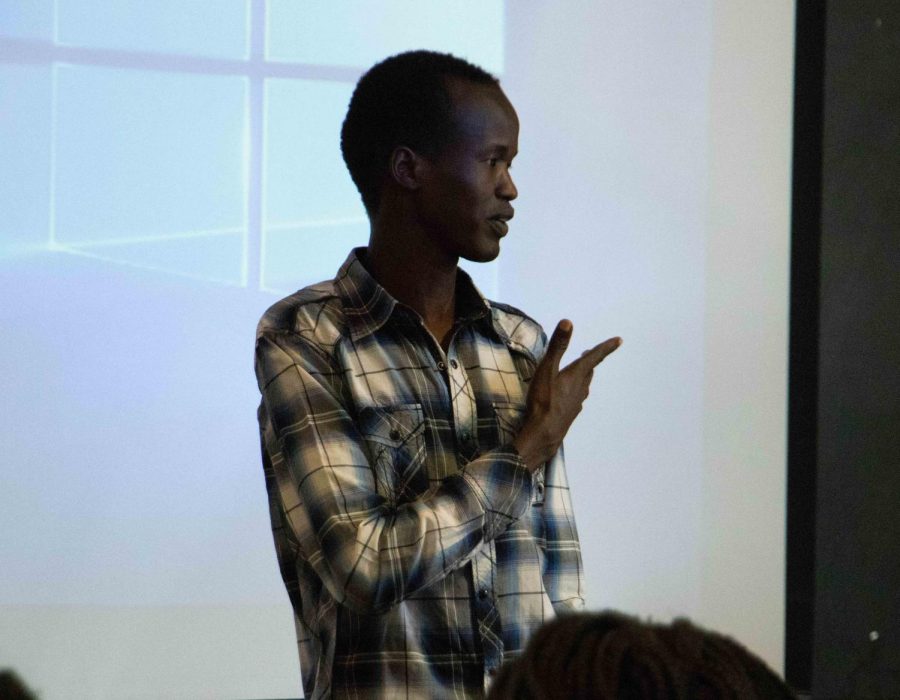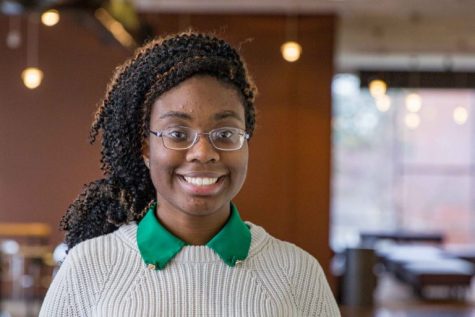UNI student recounts fleeing civil war
Mar 4, 2019
Try to imagine walking from Cedar Falls to the state of New York. It would be a lengthy journey of approximately 16 days without stopping.
UNI student FourtyTwo Yet need not imagine, for he embarked on a similar journey at age seven when he departed his war-torn village in Sudan to seek asylum in Kenya.
Though turning his back on his home in Sudan was a necessary sacrifice, safety came at a great cost.
“From when I was seven to 26, I haven’t seen my mom,” Yet said. “She’s still in the village.” He is currently 26 years old.
Last Friday, March 1, Yet presented his story as part of the Hot Wings, Hot Topics event he helped to coordinate.
The monthly event invites students and community members to the Center for Multicultural Education (CME) where they can enjoy free wings and learn about controversial topics.
Yet is a senior social work major and an active participant of both the Office of Diversity, Inclusion and Social Justice (DIS) and the UNI Veterans Association (UNIVA).
He helped coordinate this event, which featured two other panelists, Professor Stephen Gaies from the Department of Languages and Literatures, and Assistant Professor Yasemin Sari from the Department of Philosophy and World Religions.
Yet started off the panel by discussing his own experience as a refugee.
“I was one of the Lost Boys,” Yet said.
“The Lost Boys of Sudan” is a term given to the group of more than 20,000 boys displaced or orphaned during the Second Sudanese Civil War, a conflict that began in 1983 and ended in 2005.
The war claimed the lives of more than 500,000 people, according to UNICEF. “The Lost Boys” were mostly between the ages of seven and 17. They were forced to brave the Sudan wilderness to find refuge from the conflict. Many died during the trip, and the survivors mainly reside in refugee camps located in Kenya, the Sudan and Uganda.
Yet ended up in a Kenyan refugee camp.
“The things I was eating, you don’t want to know — you’re eating to survive,” Yet said. “In that situation you have no choice.”
One topic discussed by both Yet and Gaies was the length of time refugees spend in camps.
According to data presented by Gaies from the UN Refugee Agency (UNHCR), less than one percent of the world’s refugees are actually relocated as of 2017. Gaies said the statistics for 2018 could still take some time to be reported.
From 2016 to 2017, the number of refugees relocated dropped by 50 percent worldwide.
“I came to the United States five years ago from the refugee camp,” Yet said.
Yet explained that he went through a long process of many interviews where he had to wait to find out whether he would be admitted or not. One of the first opportunities he sought when he finally arrived to the U.S. was the ability to go to school.
“The only people I am in contact with are my brothers. I have 12 siblings, six girls and six boys,” Yet said. “Two of them didn’t make it during that war.”
Yet also lost his father during the war. He explained that this is how he got his name.
“I was named for the machine gun when war broke out,” Yet said. “The gun called AK-42 is a machine gun normally used to destroy the [sic] village.”
Yet explained how people would come into villages and hand guns to children and send them into their houses.
“Forty-two is a machine gun,” Yet said again. “That’s the gun that killed my dad.”
Sophomore communication major Patten Tody attended the event, and said it was empowering.
“Today’s topic was really dear to my heart because I’m also a refugee and I came here when I was seven years old in 2006,” Tody said. “For refugees, there’s so much to it that we don’t talk about. […] We don’t talk about how those people became what they are and why they’re in those countries.”
Tody said she appreciated how this event dug deeper into the issues involving refugees and immigration.
“Having this session is really empowering because you get to see the life of other people,” Tody said. “Many people don’t get that chance. So to hear a story like that, because it’s a story similar to mine’s is like, you know there are people like me out there.”
Junior finance major Laura Roman Jimenez said, “I think it was really helpful because a lot of when we think of refugees and when we think of the crisis, we often don’t realize what it entails, and as we saw out there, people thought that the U.S. or other western nations did so much more because we hear that very much inflated in the news and in the media, but when you actually look at the statistics and the facts it’s actually a very abysmal number.”
According to more research done by UNHCR, 86 percent of refugees are hosted in the developing world with the top five countries being Turkey, Pakistan, Lebanon, Iran and Uganda.
Gaies also said the amount of people being let into America has decreased significantly from 2016 to 2017.
Roman Jimenez also appreciated what presenter Sari had to say about the topic and her idea of “artificial” equality and humanity.
“Discussion is really important and remembering that also these aren’t numbers, these are people,” Jimenez said. “We do have to recognize their humanity, it is important to hear their stories as lucky as we were to hear FourtyTwo’s.”
Yet said he hoped that the event helped people to know that refugees aren’t scary, and can better understand the problems that refugees go through.
















Bettina • Mar 8, 2019 at 1:46 pm
Great story, great lead. Nice job, Lezica Barikor!
Balde • Mar 5, 2019 at 11:15 pm
This is an incredible story of resilience! I have seen some terrible things and gone through some but I can’t imagine all the struggle that brither Yet went and still goes through. Yet, he still strives for the best. He still has the ambition and will to pursue a higher education! I salute you Mr. Yet and thanks to Northern Iowan and the CME for sharing this story!